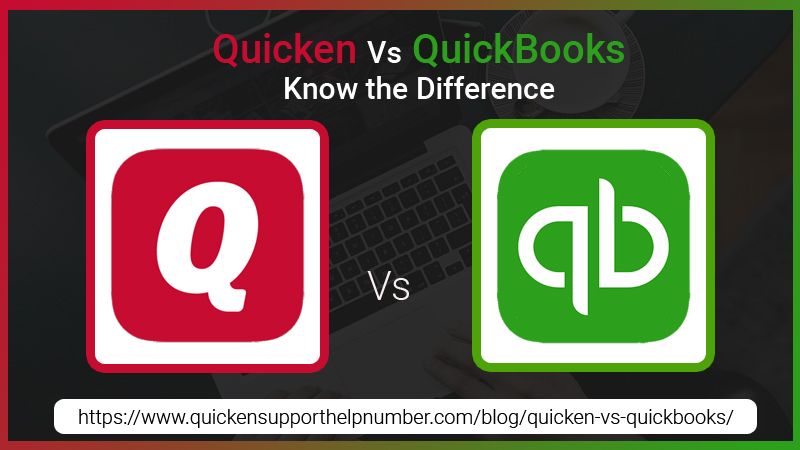Choosing the right software to manage your financial data is crucial for businesses and personal finance specialists. Two significant contenders that consistently emerge in the debate are Quicken and QuickBooks. Both products come from the same parent company, Intuit, and share a legacy of excellence. However, their functionality, user base, and features vary significantly. So, let’s delve into the Quicken vs QuickBooks debate to determine which software best suits your needs.
Quicken Vs QuickBooks Comparison
The Genesis: Understanding the Roots
Before diving deep into their comparisons, it’s crucial to understand the origins of both tools.
- Quicken – Launched in 1983, Quicken was initially developed to serve as a personal financial management tool. Over the years, it has expanded and evolved but largely remains focused on individual financial planning.
- QuickBooks – Born a decade later, in 1992, QuickBooks was explicitly designed to cater to the needs of small businesses. It’s grown massively since then, catering to diverse business sizes and needs.
Target Audience: Personal vs. Business
The most fundamental distinction between the two lies in their target audience.
- Quicken predominantly serves individuals looking for personal finance management solutions. It assists users in tracking their spending, managing their investments, and planning for retirement.
- QuickBooks, on the other hand, aims squarely at businesses. Whether you’re a sole proprietor or running a medium-sized enterprise, QuickBooks offers solutions like payroll management, invoice creation, and business reporting.
Pricing: Getting the Bang for Your Buck
The cost can be a determining factor for many when choosing between these two software options. So, let’s dissect the pricing structure.
- Quicken offers several tiers, starting from a basic version with essential budgeting features. The pricing escalates as more advanced features like investment tracking are added.
- QuickBooks typically follows a subscription model. The initial investment may seem higher, but many find it valuable given its vast array of business-specific features.
Features Face-off
When it comes to functionality, both tools shine in their respective domains. However, some differentiators are worth noting.
- Expense Tracking: Both offer this. However, QuickBooks offers a more detailed breakdown suitable for business, while Quicken’s approach is streamlined for individual use.
- Invoice Generation: This is where QuickBooks takes a clear lead. It allows users to create, customize, and send invoices directly. Quicken doesn’t have this functionality as it’s not geared towards business operations.
- Investment Tracking: Quicken is the winner here. Its robust investment tracking features are unmatched, perfect for those managing diverse portfolios.
- Payroll & Taxes: QuickBooks shines bright, seamlessly integrating payroll services and tax calculations.
Ease of Use: Navigating the Waters
Both tools prioritize user experience, but there are slight differences.
- Quicken offers a more straightforward interface, given its individual-focused design. It’s intuitive for users to manage personal finances without too many complexities.
- QuickBooks is more intricate due to its comprehensive business functionalities. However, it does a commendable job of keeping things organized and user-friendly.
Integration & Expansion: Playing Well with Others
How software integrates with other tools is vital in today’s interconnected world.
- QuickBooks emerges as the champion. Its capability to integrate with hundreds of third-party apps, from inventory management to CRM systems, is unparalleled. This makes it a powerful tool for businesses aiming to streamline their operations.
- Quicken, being a personal finance tool, doesn’t put as much emphasis on integration. However, it still connects several financial institutions for seamless data import.
Security: Safeguarding Your Data
Financial data is sensitive, and both tools are aware of this.
- Both Quicken and QuickBooks employ robust encryption methods to keep user data safe. They also offer multi-factor authentication for added security.
Final Verdict: QuickBooks vs Quicken
Choosing between Quicken and QuickBooks boils down to your primary need.
- If personal finance management is your focus, Quicken is designed for you. With its ease of use and emphasis on investment tracking, it offers individuals a comprehensive solution.
- For businesses, however, QuickBooks is a no-brainer. Its expansive feature set, tailored to handle business operations, makes it a valuable asset for enterprises of all sizes.
Both tools have carved their niche in the Quicken vs QuickBooks debate, demonstrating excellence in their respective domains. Your choice should be based on whether you manage personal finances or steer a business towards success. Whatever you choose, rest assured you’re opting for a tool backed by decades of expertise from Intuit.


